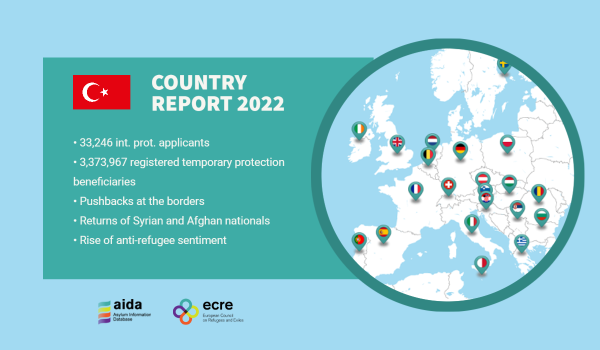The updated AIDA Country Report on Türkiye provides a detailed overview on legislative and practice-related developments in asylum procedures, reception conditions, detention of asylum seekers, content of international protection in 2022.
One of the significant changes that occurred in the country in 2022 was the overall policy change regarding Syrian nationals, as the temporary protection scheme came under scrutiny as a consequence of the increasingly anti-refugee rhetoric in the country. Stakeholders reported that various police operations – in addition to the existing “deconcentration” policy in main cities – resulted in mass arrests and deportations of Syrians. Hundreds of Syrian men and boys were imprisoned and forced to sign voluntary return forms before being deported to northern Syria. Türkiye announced in August 2022 that 517,000 Syrians had safely and voluntarily returned to Syria and at least 70% of the temporary protection beneficiaries were ready to return. However, UNHCR stated that mass returns to Syria are unlikely to take place in the near future. The situation in the country remained concerning also for Afghan nationals. While after the Taliban’s takeover of the country returns to Afghanistan were halted for a short period, 44,786 Afghans were returned to Afghanistan with 186 charter flights in 2022. While all the returnees signed a return form voluntarily, from March 2021 to May 2022, Amnesty International documented 155 cases of illegal deportation and 23 pushbacks of Afghans involving gunshots at the border.
Pushbacks on the Greek-Turkish border and practices directed at blocking cross-border movements on the Turkish-Iranian border made it often deadly to enter and exit the region, while irregular border crossings along the Iranian border continued to spark public outcries. The severe economic crisis additionally influenced discussions on migration throughout the year. According to a national survey conducted in March 2022, 81% of Turkish citizens support the repatriation of Syrian refugees. In another survey conducted by Kadir Has University in 26 Turkish cities, respondents ranked “refugees” as the second most pressing issue in their lives. This elevated anti-refugee sentiments that were further exacerbated by the political discourse surrounding the general elections in May 2023.
While a slight increase (from 29,250 to 33,246) in the number of international protection applicants was observed, there was a significant decrease in the number of registered temporary protection beneficiaries (from 3,535,898 to 3,373,967). Registration was reportedly difficult to access both for international and temporary protection seekers in 2022, which led to many being unable to access essential services. In the context of the implementation of the EU-Türkiye readmissions to Türkiye continued to be frozen throughout 2022. As of May 2023, 37,743 Syrians had been resettled (since 2016) to the EU under the 1:1 scheme.
Another relevant development on migration and asylum in the country related to the significant numbers of arrivals from Ukraine and Russia in 2022. It was reported that around 145,000 Ukrainians reached Türkiye since the beginning of the full-scale war in February 2022. According to UNHCR, the number of Ukrainians present in the country by January 2023 was 95,000. Many Russians are also present in the country; their profiles vary. There are anti-war activists and political opponents of President Vladimir Putin worried about Moscow’s crackdown on the opposition, but also young men who are afraid of being drafted into the army to fight in Ukraine, and middle-class professionals pessimistic about their economic prospects at home in the aftermath of Western sanctions and Russia’s own implementation of capital controls. Russians ranked first in long-term residency permits with 146,063 and third in family permits with 7,732 as of May 25, 2023.
For further information:
- Find comparative information in the Asylum Information Database (AIDA) managed by ECRE

